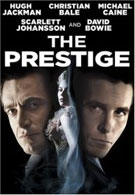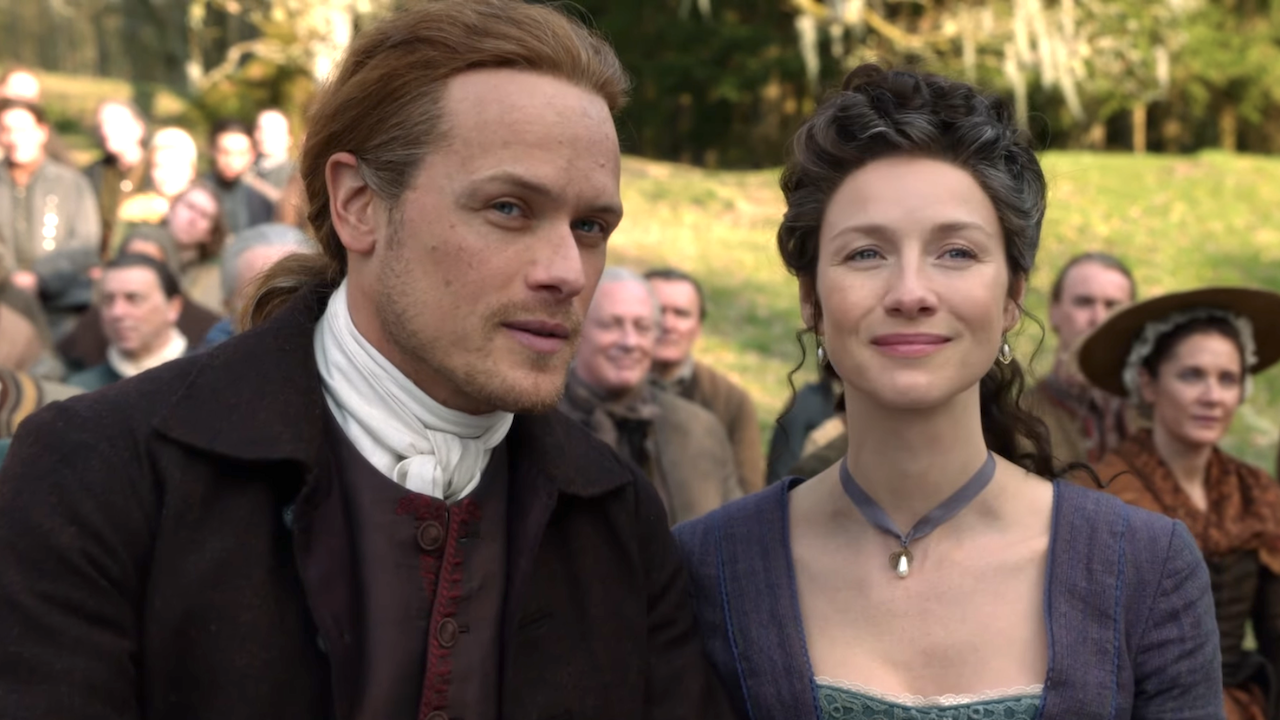It’s Batman Vs. Wolverine in the latest puzzler from the mind bending director Christopher Nolan (Memento). Christian Bale and Michael Caine from Nolan’s Batman Begins join X-man Hugh Jackman for a turn of the century Victorian mystery about a pair of obsessed magicians committed to the destruction of one another. Since this is a Christopher Nolan film, the twisted tale is twisted into the most non-linear shape possible, and leads us unconvincingly from the mystery genre into outright and outrageous fantasy.
All mysteries are, at their most basic level, games of wit between author and reader. There is an unspoken rule in classic mystery fiction from Agatha Christie to John Dickson Carr that you must play fair with your audience. This means that the solution to any mystery must be of this earth and not some solution that involves stretching credulity beyond the realms of human knowledge into the occult or speculative science.
The Prestige is clearly constructed as a mystery. It begins with one magician dead and the other on trial for his murder. We then slip into a series of chinese boxed flashbacks dramatizing the rivalry between two obsessed magicians living in London during the late 1800’s, the great Golden Age of theatrical magic. Each wants to be the greatest and when Alfred Borden(Christian Bale) invents a trick called the “Transported Man”, Robert Angier(Hugh Jackman)becomes as obsessed as Victor Frankenstein with figuring out how it’s done. He comes up with his own version, “The NEW Transported Man” which due to his greater theatrical prowess is the talk of the town. Borden, a lesser performer but a great craftsman, is forced to try and compete, re-naming his version, “The ORIGINAL Transported Man”. But their bloody rivalry goes deeper than mere fame and fortune since Angier blames Borden for the death of his wife Julia (Piper Perabo) in an onstage accident. Suffice it to say that both men are ready to go to very great lengths for their art and that murder may be the least of all the sins on their souls.
There is much to love in this film and in particular the screenplay by Nolan and his brother Jonathan Nolan doesn’t miss a thematic beat. Everything in the story seems to have a double edged meaning, from the nature of reality versus illusion to the methods and deception involved in storytelling, both literary and cinematic. The film is based on a novel by Christopher Priest and the Nolan brothers have effectively translated his literary meta-fiction into the cinematic. One of the most complex things to depict in a movie is past tense, since a film is always unfolding in real time, here in the present. “Ten Years ago” becomes “right now” once we get past the transition. The Prestige is constructed around two levels of narrative drill down: Borden is seen reading from Angier’s diary, while in that past, Angier is desperately trying to decipher Borden’s journal. Therefore the story is told by both men, one narrative wrapped inside the other. So we’re watching a story told to us completely in the past tense, shifting between the points of view of two obsessed characters who cannot see the truth of anything past their own noses. It’s up to the viewer to observe these superimposed realities and decide upon the truth of the narrative themselves. It’s a very elegant structure and one of the most challenging screenplays of 2007. The brothers Nolan have taken the structure of the classic magic act: The “Pledge”, the “Turn” and the “Prestige” and used it for the three acts of their film. “The Prestige” is the part where the magician brings back whatever he made disappear but with some kind of dazzling flourish. Unfortunately, this flourish is what takes a brilliant film and reduces it to a flawed, but interesting work.
The entire narrative hinges on the “Transported Man” illusion. It’s actually really simple: A magician enters one box and pops out of another across the stage in a split second. If you think about it, there can only be one solution to it. At least in the physical world. Michael Caine, wonderful as always, plays Cutter, a veteran designer of theatrical illusions who continually makes the point that a trick is nothing once the secret is revealed. The solution is always a simple one and usually terribly mundane. The bullheaded Angier cannot accept this and goes to great lengths to find what he believes is the real secret to Borden’s stunning illusion: The work of scientist Nicola Tesla, played with great calm and subtlety by David Bowie. The result of this mad search leads the story into the kind of occult and speculative science that renders the rational mystery moot. There is no way for anyone to predict the possibilities of Tesla’s magical mystery box. What appeared to be a rational mystery along the lines of Conan Doyle is revealed to be more akin to Poe and Lovecraft. At first this U-turn into the fantastique is welcome. Especially since the classic mystery aspect, one of the film’s “shock” reveals, is incredibly, mind numbingly obvious. The swift descent into the fantastique saves us briefly from the tiresome Mission: Impossible disguises and takes the movie into the cinematic territory of Cronenberg and Lynch.
But this pleasure is short lived. While it would not be a surprise in the films of Lynch or Cronenberg, this U-turn is a complete surprise for the very glum and realist Christopher Nolan who last turned 2004’s best movie, Batman Begins into the most believable “Batman” film ever made. When laid out and actually examined, the plot of The Prestige is a ludicrous Grand Guignol melodrama featuring villainous moustaches and fake beards, machines never seen on earth outside The Bride of Frankenstein, and Xeroxing taken to the nth degree. The tale is pure camp played as if it were the final act of Hamlet. Nolan does not have the sly touch needed to pull off this kind of mad melodrama so he goes for the most grim seriousness he can muster in the hopes that no one will notice the insane revelations that are about to come. In hindsight, he may have been right. This kind of mad story may have reached the pinnacle of hilarity if left in the hands of a Paul Verhoeven or Brian DePalma, two filmmakers who would laugh out loud throughout the shooting.
It’s when you realize where the story is headed that the Nolans are revealed to be wearing some very new duds from the ol’Emperor. The screenplay attempts to add weight to itself by mirroring the destructive competition between the two magicians with the private war between Tesla and Thomas Edison. The purity of Tesla to the business sense of Edison. But it’s still just a thin man in a fat suit. In Nolan’s other films, his trademark time shifting seemed to be a necessity. Here the narrative seems cut up arbitrarily, like a late night scissor session with William Burroughs. So don’t look too hard for Borges or Kafka here: John Huston’s The List of Adrian Messenger and Anthony Shaffer’s Sleuth are the true spiritual ancestors of The Prestige. Both are stylish and witty contraptions without the heavy moral illusions Nolan hangs on this film.
Your Daily Blend of Entertainment News
The cast is excellent. Christian Bale continues to lay claim to being the premier actor of his generation and contrasts very well with the more theatrical stylization of Hugh Jackman who somehow keeps Angier from becoming completely unsympathetic . David Bowie makes me wish once again that the man commit more of his time to acting while Gollum himself, Andy Serkis, is a fine actor even without computer enhancement. Piper Perabo is a pleasant surprise in her brief appearance onscreen, lending her character a real sensitivity and wit in her scenes with Jackman. Scarlett Johannson appears in her 700th film this year and her character is completely ambiguous to me now. Is she sent by Borden to spy on Angier or Angier to spy on Borden? She is a plot device rather than a character. Johansson does what she can with the thin material but the real meat is given to the excellent Rebecca Hall as Borden’s sad and suffering wife, Sarah. Bale’s scenes with her are the only truly human ones in the film. The only moments of actual feeling emerge from their relationship. The resolution reveals a nasty and predictable trick which makes you ache for a different, deeper movie about deception. As it is, t’s just another plot device in the machinery.
In the end The Prestige is the kind of film the mentor and engineer Cutter(Caine) might have made were he a filmmaker. A coldly calculated, carefully constructed machine designed purely to amuse and delight and then to be easily forgotten once the applause dies down. The film, shot by Nolan’s Batman Begins cinematographer Wally Pfister is beautiful and dark. But the true moral weight of Nolan’s previous films, including Batman Begins is not to be found here. Any serious discussion about “themes” is total nonsense. This is a cinematic trick, nothing more, and the deadpan seriousness is merely part of the effect not an end in itself. The characters of Borden and Angier demonstrate this idea very succinctly. Borden’s technical brilliance cannot overcome his lack of grand showmanship while the slicker Angier is all show and no heart. Nolan wishes to appear as Borden but in reality the film he has produced is really just Angier in a Borden disguise. The DVD is presented in Widescreen Anamorphic 2.35:1, enhanced for 16X9 Televisions. It’s also available in a Blu-Ray edition. The cinematography is very dark but the transfer is crisp and there is no trouble at all with the contrast. Audio is Dolby Digital 5.1 Surround with 3 audio tracks: English, French and Spanish. There are French and English subtitles as well.
Why there is no audio commentary included is a mystery unto itself. Nolan has proven on his previous commentary tracks to be a very articulate filmmaker willing to go to lengths to explain the choices made for his films. This film, so complex and with so many odd choices, would’ve made for a very informative track. As it is, we have to make do with the usual featurettes. The DVD presents 5 short pieces all lumped under the umbrella title The Director’s Notebook: The Cinematic Sleight of Hand of Christopher Nolan which, thankfully, is a lot less pretentious than it sounds. The sleights of hand noted are:Conjuring the Past,The Visual Maze,Metaphors of Deception, Tesla: The Man Who Invented the 20th Century, and Resonances. The whole thing lasts for about 20 minutes which is very disappointing since each of those subjects could’ve merited a 20 minute feature on their own. As they are, they end just as they begin to get interesting. In any case, I would toss all of them out for an audio commentary by the Nolans.
The Art of the Prestige,four sets of still photographs of Film, Costume and Sets, Behind the Scenes, and Poster Art and a collection of trailers round out the thin extras.
The Prestige may not have been the biggest hit of the year nor is it a complete artistic success but it remains an incredibly fascinating piece of filmmaking by one of the best filmmakers working today. Hopefully there will be a more comprehensive release in the future, one that covers more of the background involved in its creation.

